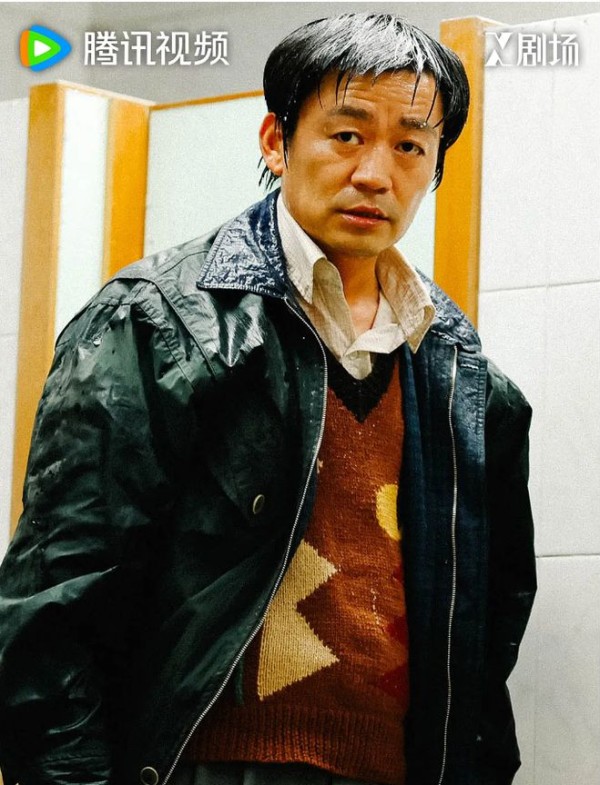【译】在孤独与渴望的情绪中:王家卫的电影是如何描述情绪的?
In the mood for loneliness and longing: How Wong Kar Wai depicts emotion
3 February 2021
ByAnn Lee
【本文首发于《虹膜》公众号】
作者:Ann Lee
译者:覃天
校对:易二三
来源:Sight&Sound(2021年2月3日)
https://www.bfi.org.uk/features/mood-love-wong-kar-wai-emotion
Cinema’s poet of solitude, heartbreak and desire, Wong Kar Wai makes films that enchant the senses. As a new season of his work launches online, Ann Lee explores a cinematic world of intense feeling.
电影是一门集结了孤独,心碎和欲望的艺术,而王家卫则将这些情绪附着在了自己的电影中。这篇文章就将带领大家进入王家卫充满了强烈情感的电影世界。
Watching a Wong Kar Wai film means entering a world of heightened emotions. It’s not just that they tell unforgettable stories of ill-fated romance, but it’s the masterful way the Hong Kong auteur draws you in ever so tantalisingly. Dreamlike textures, vivid colours and evocative music weave a potent atmosphere that leaves you completely hypnotised.
As a director obsessed with the heart-pounding thrill of seduction, he knows exactly how to beguile his audience just as mesmerisingly. His haunting mood pieces enchant the senses – it’s the closest you’ll get to experiencing the exhilarating rush of falling in love while at thecinema.
选择看一部王家卫的电影,就意味着进入一个情绪充盈的世界。这不仅是因为它们讲述了令人难忘,命运多舛的浪漫故事,更因为这位香港导演吸引观众的高超手段。影片中梦幻般的质地,鲜艳的色彩和激动人心的音乐编织出一种强烈的氛围,让你完全被催眠。作为一名痴迷于诱惑带来的沉醉感的导演,他完全知道如何迷人地迷惑他的观众。那些令人难以忘怀的情绪片段迷住了观众的感官——这是你在电影院里最接近坠入爱河的体验。
As a young boy, who moved with his family from Shanghai to Hong Kong in 1962, Wong spent most of his time with his mother, an avid film buff, in the cinema. “We spent almost every day watching films – French films, Hollywood films, Italian films, films from Taiwan and local productions,” he said at 2017’s Lumière Festival. “This was sort of my film school, myeducation.”
1962年,王家卫和家人从上海搬到香港,他的母亲是一个狂热的影迷,因此,少年王家卫大部分时间都和她在电影院里度过。王家卫在2017年的卢米埃尔电影节上表示:「我们那时几乎每天都在看电影——法国电影、好莱坞电影、意大利电影、台湾电影和香港本地的影片。在某种程度上,电影院既是我的电影学校,也是我接受影像教育的地方。」
His wide-ranging influences became apparent once he started directing. His moody feature debut, As Tears Go By (1988), earned comparisons to Martin Scorsese’s Mean Streets (1973), while Chungking Express (1994) channelled the unconventional spirit of Jean-Luc Godard’s Breathless (1960). Wong’s mentor Patrick Tam had an impact too on his neon-drenched visualpalette.
而当王家卫开始执导影片时,他广泛涉猎所带来的影响就开始变得显而易见了。他那部充满了喜怒无常情绪的处女座《旺角卡门》(1988)常常被拿来与马丁·斯科塞斯的《穷街陋巷》(1973)进行对比,而《重庆森林》(1994)则被认为继承了戈达尔《筋疲力尽》中的反主流精神。王家卫的良师益友谭家明也对他电影中,充满了霓虹色调的视觉特征产生了影响。
Wong, a formerTVscriptwriter, was also inspired by literature, particularly the works of Haruki Murakami, Liu Yichang and Gabriel García Márquez. But the novelist who had the biggest impact on him was Manuel Puig. The Argentinian author’s writing style – stories told in fragments using multiple points of view – shaped Wong’s own narrativetechnique.
王家卫曾做过电视台的编剧,他的影像灵感也来自文学,特别是村上春树、刘以鬯以及马尔克斯的作品。但给王家卫影响最大的小说家是曼努埃尔·普伊格。这位阿根廷作家的写作风格讲究使用多个视角分段讲述故事——这深刻地塑造了王家卫的叙事技巧。
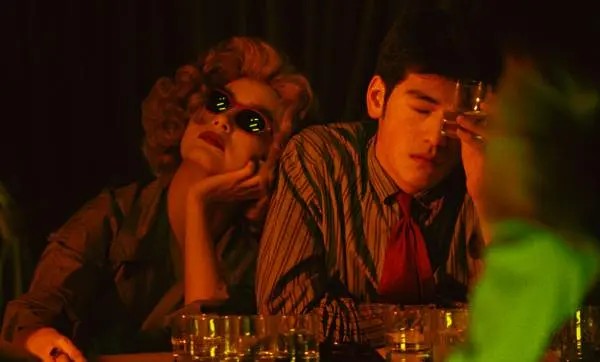
The director took these interests and turned them into something completely unique with his deeply profound and soul-stirring stories of love, alienation and heartbreak. Wong found international acclaim, winning the best director prize at 1997’s Cannes Film Festival for Happy Together, because he was a pioneer who created his own cinematic language for romance, one that was swooningly lyrical and visually stunning. He made the torment of our inner thoughts seem sexy, poetic andglamorous.
这位导演深受这些爱好影响,并用他深刻而惊心动魄的爱情、疏离和心碎的故事把它们变成了完全独特的影片。在1997年的戛纳电影节上,王家卫凭借《春光乍泄》赢得了最佳导演奖,从而获得了国际性的赞誉,因为他是一个开创了自己的浪漫电影语言的先驱导演,他的电影语言带有令人着迷的抒情,以及让人惊叹的视觉呈现。他和他的作品让我们心中的痛苦看起来性感、诗意且魅力十足。
Wong’s films have always prioritised feelings above everything else. To mark theBFIand theICA’s joint career-spanning retrospective of the groundbreaking director, we explore the main ones that have dominated the emotional landscape of hisfilms.
王家卫的电影总是把感觉放在首位。为了纪念英国电影协会以及伦敦当代艺术学院联合举办的王家卫职业回顾展,我们在这篇文章中探索了主导他的电影情感版图的主要因素。
Loneliness
孤独
While Wong is nothing but affectionate in his portrayal of Hong Kong, the director recognises the urban alienation that comes with bustling city life and its throngs of people jostling for space. Loneliness is something that he conveys movingly in his films, using innovative techniques to highlight the dreaminess of oursolitude.
虽然王家卫对香港的刻画充满深情,但他承认,繁忙的城市生活和争抢空间的人群,让城市充满了疏离感。孤独是他在电影中传达的,感人至深的东西,并且他用创新的手法突出了人们内心孤独的梦幻感和朦胧感。
Together with cinematographer and long-term collaborator Christopher Doyle, Wong created a special process combining undercranking and step-printingto play around with the sense of time passing. Characters sometimes appear in slow motion as everyone around them is sped up into an indistinguishable blur, a chaotic jumble of bodies that disappear quickly into thenight.
王家卫与摄影师兼长期合作伙伴杜可风一起创造了一种特殊的拍摄过程:将慢速摄影和抽帧结合在一起,玩弄着时间流逝的感觉。电影中的角色有时会以慢动作出现,他们周围的人群逐渐加速,模糊成一片混沌的身影,而后很快地融入黑夜中。
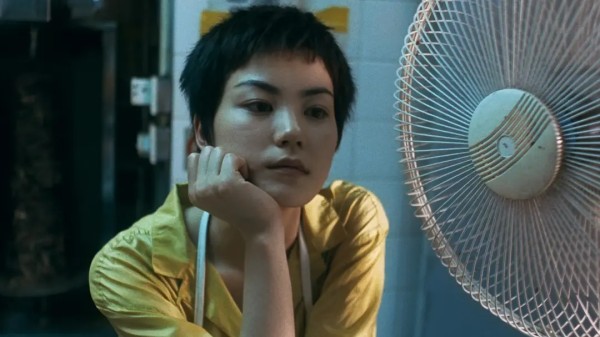
In Chungking Express, an offbeat romance about 2heartbroken policemen, Wong finds light-hearted humour in his characters’ struggles for real connection. Faye (Faye Wong), a vivacious shop worker, has a crush on Cop 663 (Tony Leung).Her way of getting closer to him is by breaking into his flat to clean it and rearrange or replace his belongings, while he has started speaking to household objects after he gets dumped. He encourages a bar of soap to be more confident, cajoles a giant teddy bear and lavishes a shirt with affection. All the while, he’s pining for his ex-girlfriend and oblivious to the possibility of a new love, even one that has already been inhabiting hislife.
在《重庆森林》中,王家卫在角色之间真实联系的挣扎感中,找到了一些轻松幽默的瞬间。这是一部关于两名心碎警察的不同寻常的浪漫故事。活泼的店员阿菲(王菲饰)迷上了编号是663的警察(梁朝伟饰),她接近他的方式是闯入他的公寓打扫,重新整理或更换他的东西,663在失恋后已经开始对这家居物品自言自语:他时而鼓励一块肥皂变得更加自信,时而对着一只巨大的泰迪熊说着甜言蜜语,并兴奋地穿上一件衬衫。一直以来,他都在思念他的前女友,忘记了自己随时有可能开始一段新的爱情,即使这段爱情早已存在于他的日常生活中。
Wong uses voiceovers to compound this feeling of solitude as introspection spills out in quirky monologues and philosophical musings. People might brush past each other in the street – just 0.01cm apart – but they’re so wrapped up in their own thoughts, they don’t realise there are opportunities around them to break out of theirloneliness.
当人物在自言自语和哲思中自省时,王家卫使用画外音来加剧了这种孤独感。人们可能会在街上擦肩而过——彼此之间只有0.01公分的距离——但他们太专注于自己的想法,丝毫没有意识到有机会打破周遭的孤独。
Outside of the mayhem of the city, his characters seek isolation far from home. It’s only here that they can finally unburden themselves of their tortured memories and their past. In Wong’s romantic masterpiece, In the Mood for Love (2000), Chow Mo-wan (Tony Leung) whispers his secret anguish into a hole in Cambodia’s Angkor Wat. Emotional release only comes with total seclusion, the vast landscape swallowing up their romanticwoes.
在香港这座城市的混乱之外,王家卫电影中的人物在远离家乡的地方寻求与世隔绝的生活。只有在这里,他们才能终于从痛苦的记忆和过去中解脱出来。在王家卫的浪漫杰作《花样年华》(2000)中,周慕云(梁朝伟饰)在柬埔寨吴哥窟的一个石洞里低声诉说着他内心的痛苦。原来,情感的释放只有在完全与世隔绝的情况下才能到来,广袤的风景吞噬了他浪漫的痛苦。
Longing
渴望
Wong is cinema’s ultimate hopeless romantic, who has dedicated his career to portraying the mysteries of love, digging deep to explore its many contradictions. Emotions may be fleeting but in his films they’re life-changing and their effects linger on for years – one brief moment has the power to change someoneirrevocably.
王家卫作为一名导演,同时还是一位悲观的浪漫主义者,他的作品致力于描绘爱情的奥秘,深入挖掘其中的许多矛盾。情感可能是转瞬即逝的,但在他的电影中,它们改变了角色的生活,它们的影响持续了多年——一个短暂的瞬间就有不可挽回的,改变一个人的力量。
When it comes to romance, Wong is fascinated with that electrifying limbo that exists between desire and fulfilment. Not that fulfilment is ever guaranteed – most of his characters become stuck, yearning for people they cannot have. Even then, their romantic anguish has a bittersweet quality to it, their suffering intensifying theirfeelings.
谈到浪漫,王家卫迷恋于悬而未定之感,在欲望与满足之间摇曳,令人兴奋无比。这并不是说,满足感一定可以得到保证——他电影中的大多数人物都陷入了困境,向往他们无法拥有的人。即便如此,他们的浪漫和痛苦也是苦乐参半,正是他们的痛苦加剧了他们的情感。
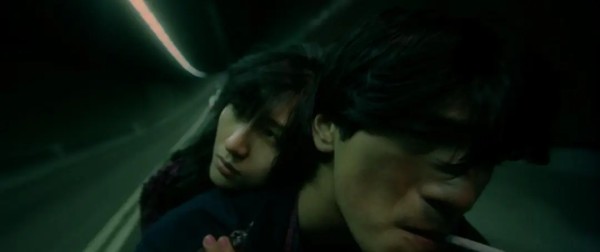
“There are some people you can never get close to. Get too close, and you’ll find him boring,” sighs the killer’s agent (Michelle Reis) in Fallen Angels (1995), who aches for the ruthless assassin she is partnered up with. Wong’s characters are more comfortable keeping love at a distance. Even when feelings are reciprocated, relationships are never easy. His romances are blighted by missed opportunities, where the timing is never quite right and life ends up getting in the way. Love is not alwaysenough.
「有些人是不适合太接近的,知道得太多反而没有兴趣。」在《堕落天使》(1995)中,天使2号(李嘉欣饰)叹息道,她渴望的是与之搭档的那个无情杀手。王家卫电影中的人物更喜欢有距离的爱情。即使感情得到了回报,他们之间的关系也从来不是一帆风顺。他们自身的浪漫故事总是被错失的机会所破坏,时机从来都不是很合适,生活最终也成了绊脚石。原来,光有爱情是不够的。
While lovers disappear, one thing that remains after a relationship ends is their memories of the affair. Their imagination keeps them bound forever to their lost love. Cop 223 (Takeshi Kaneshiro) muses in Chungking Express: “If memories could be canned, would they also have expiry dates? If so, I hope they last forcenturies.”
当恋人们结束一段关系后,他们之间留下的唯一一件事就是他们对这段恋情的记忆。回忆,将把他们永远束缚在失去的爱情中。编号是223的警察(金城武饰)在《重庆森林》中若有所思地说:「如果记忆也是一个罐头的话,我希望这罐罐头不会过期。如果一定要加一个日子的话,我希望它是一万年。」
But it’s not just longing for a person that consumes Wong’s films;there’s also a sense of yearning for a time gone by. The director lovingly recreates the Hong Kong of his childhood with the help of production designer William Chang, transporting us back to the 1960s in Days of Being Wild (1990), In the Mood for Love, 2046 (2004) and The Hand (2004). Like his characters, he remains deeply nostalgic for a past thathas shaped him into becoming the person he istoday.
然而,王家卫的电影中不仅充斥着对一个人的渴望,还有一种对逝去的时间的向往。在美术指导张叔平的帮助下,这位导演深情地重现了他童年时的香港,他在《阿飞正传》(1990)、《花样年华》(2000)、《2046》(2004)和《手》(2004)中将我们带回了20世纪60年代。就像他的角色一样,他仍然深深怀念过去,这段过去的经历塑造了今天的他。
Sadness
悲伤
A profound sadness sweeps through Wong’s films as people are left unmoored by romantic grief, forever ruminating on past hurts and betrayals, unable to move forward with their lives. But its oppressive weight is changed into something beautiful. Wong’s hazy air of melancholy is daubed in lush colours, wistful glances and poetic voiceovers. Despair has never looked as ravishing as it does in hiseyes.
一种深深的悲伤席卷了王家卫的电影,其中的那些角色被浪漫的悲伤所牵引,永远在反思自身过往经历的伤害和背叛,无法继续前进。但它压抑的重量最终变成了一些美丽的东西。王家卫电影中朦胧、忧郁的气息被赋予了丰富的色彩、思念的目光和诗意的画外音。绝望在那些角色的眼神中显得令人着迷。
His characters are often struggling with the burden of regret. In Ashes of Time (1994), Wong’s magnificent homage to the wuxia genre, the director turns the brutal action of martial arts films into a graceful ballet of anguish, heartbreak and loneliness. The film’s most powerful scene comes in a heartbreaking monologue from Maggie Cheung as The Woman, who laments the mistakes she has made and the wasted years. It shows how sadness can become toxic if left to stew into bitterness.
除此之外,王家卫电影中的人物还常常在悔恨的重担中挣扎。在他对武侠片壮丽的致敬——《东邪西毒》(1994)中,他将武侠片中的残酷动作演绎成了一出充满痛苦、心碎、孤独、优美的芭蕾舞剧。这部电影最有力的一幕来自张曼玉令人心碎的独白,她饰演的女人哀叹自己犯下的错误和浪费的岁月。这表明,如果任悲伤煎熬成苦涩,那么它就可能会变得有毒。
Even when Wong looks to the future, it’s one that’s dominated by the past. In 2046, he envisages a dystopian world where lonely souls travel to a mysterious destination in an attempt to regain their lost memories. There no one ever feels sadness. “In 2046, nothing ever changes,” says Chow Mo-wan (Leung). “But no one really knows if that’s true or not. Because nobody has ever comeback.”
即使当王家卫展望未来时,那也是一个由过去主导的未来。在《2046》中,他设想了一个反乌托邦的世界,在那里,孤独的灵魂前往一个神秘的目的地,试图找回失去的记忆。没有人会感到悲伤。「在2046,一切事物永不改变,」周慕云(梁朝伟饰)说。「没有人知道这是不是真的,因为从来没有人回来过。」
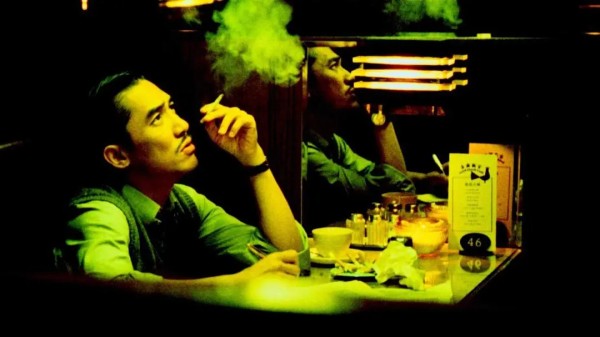
While in The Grandmaster (2013), a biopic based on the life of Bruce Lee’s martial arts teacher, Ip Man’s (Leung) anguish comes from being exiled from both his wife and home. The wing chun master moves to Hong Kong in 1950 with dreams of becoming a martial arts teacher. A year later, China closes the border with the city, so he can no longerreturn.
在根据李小龙的武术老师生平改编的传记片《一代宗师》(2013)中,叶问(梁朝伟饰)的痛苦来自于要离开自己的妻子和熟悉的家中。这位咏春大师于1950年移居香港,他希望成为一名武术老师。一年后,内地对香港的口岸实行了边境管理,所以他再也不能回去了。
The film teases a forbidden romance between Ip Man and Gong Er (Zhang Ziyi), the strong-willed daughter of another grandmaster. As they talk about what could have been, she tells him: “How boring it would be to have no regrets.” No doubt Wong wouldagree.
在《一代宗师》中,王家卫还描绘了叶问和另一位八卦拳宗师的独生女宫二(章子怡饰)之间,被压抑的感情。当他们在谈论这段感情时,宫二告诉他:「如果人生真无悔,该有多无趣啊。」毫无疑问,王家卫肯定非常赞赏这句话。
Desire
欲望
Wong’s films explore the seductive pull of desire and how its erotic power becomes more intense precisely because it’s unfulfilled. He’s not so much interested in sex as he is in how imagination and intimacy fueldesire.
王家卫的电影探索了欲望的诱人吸引力,以及它的性欲望是如何因为没有实现而变得更加强烈的。与其说他对性感兴趣,不如说他对幻想和亲密关系如何激发欲望感兴趣。
In The Hand, a short film he made as part of the anthology feature Eros (2004), Wong shows how it can become a life-long obsession, sparked by the briefest of encounters. The sexiest scene comes when Zhang (Chang Chen), a young tailor who is hopelessly infatuated with an older courtesan (Gong Li), caresses the dress he’s making for her as if he’s touching herbody.
在他为《爱神》(2004)拍摄的短片《手》中,王家卫展示了在最短暂的邂逅中,欲望如何转变成为了一种终身痴迷的力量。最性感的一幕发生在年轻裁缝(张震饰)无可救药地迷恋着一位年长的妓女(巩俐饰),他抚摸着为她做的裙子,就好像他在触摸她的身体一样。
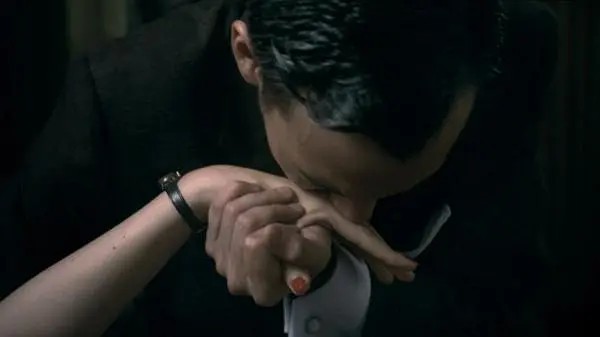
The exquisite cinematography in each of Wong’s films is an act of seduction, a visual expression of desire. Doyle is a frequent collaborator but Wong’s also worked with Andrew Lau, Mark Lee Ping-bing, Philippe Le Sourd, Lai Yiu-fai, Kwan Pung-leung and Darius Khondji. The camera focuses on the tiniest of details while the same images are often repeated – a curtain fluttering haphazardly in the wind, a woman slinking down some stairs dressed in a cheongsam, the thunderous swirl of a waterfall. Every frame e
xudes a dreamysensuality.
在王家卫的每一部电影中,精美的摄影不仅是一种诱惑的表现,还是一种欲望的视觉表达。杜可风是王家卫经常合作的摄影师,但他也和刘伟强、李屏宾、菲利普·勒素、黎耀辉、关本良、达吕斯·康第合作过。电影镜头往往聚焦在最微小的细节上,而同样的画面经常被重复——被风吹动的窗帘;一个穿着旗袍的女子从楼梯上走下来;瀑布倾泻而下,形成雷鸣般的漩涡。每一帧画面都散发着梦幻般的感官享受。
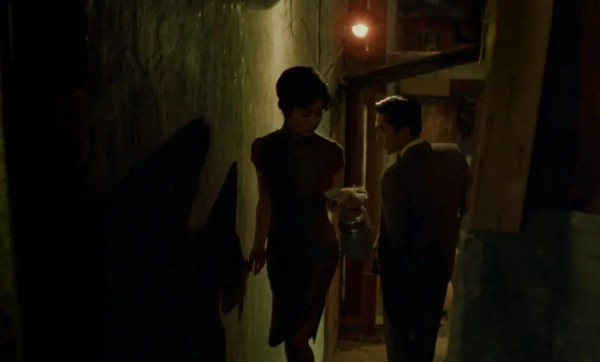
In the Mood for Love is Wong’s ultimate rhapsody to desire, an intoxicating romance about 2 neighbours (Maggie Cheung and Tony Leung) who fall in love with each other after they discover their spouses are cheating. Despite their growing attraction, they’re determined not to stoop to the same level as their partners, so they try to resist their feelings. Their illicit affair is depicted in the most passionate of colours – shades of red seeping through thescreen.
《花样年华》是王家卫的欲望终极狂想曲,它讲述了两位邻居(张曼玉和梁朝伟饰)在发现各自的伴侣出轨后,坠入爱河的浪漫故事。尽管他们之间的吸引力与日俱增,但他们决心不会堕落到和他们的伴侣一样的水平,所以他们试图抗拒自己的感情。在银幕上,他们之间不正当的婚外情被转为了最富有激情的颜色——深浅不一的红色从屏幕上渗出。
When desire is fulfilled, Wong brings his own luscious romanticism to each moment. Wah (Andy Lau) and Ngor (Cheung) embrace passionately in a phone booth in As Tears Go By, while Jeremy (Jude Law) tenderly kisses the pie crumbs off Elizabeth’s (Norah Jones) lips in My Blueberry Nights (2007). Yet desire can become corrupted – Happy Together (1997), an intense portrayal of love and lust between a gay couple, shows how easily it transforms into jealousy, possessiveness andrage.
当欲望得到满足时,王家卫将自己甜蜜的浪漫感渗入到每一个时刻。在《旺角卡门》里,阿杰(刘德华饰)和阿娥(张曼玉饰)在电话亭里热情地拥抱着,而杰瑞米(裘德·洛饰)则在《蓝莓之夜》(2007)中温柔地亲掉了伊丽莎白(诺拉·琼斯饰)嘴唇上的馅饼屑。然而,欲望也会变得腐化——《春光乍泄》(1997)描绘了一对同性情侣之间的强烈的爱情和欲望,这部电影展示了它是多么容易转化为嫉妒、占有和愤怒。
Boredom
无聊
Boredom is another feeling that feeds into Wong’s world;the restlessness experienced by his characters speaks to a deeper sense of existential ennui. It’s a feeling that grips Yuddy (Leslie Cheung) in Days of Being Wild, an apathetic playboy in 1960s Hong Kong who spends his days callously seducing women. It’s the reason he starts talking to Su Li-zhen (Maggie Cheung), a shy shop assistant. They start out by becoming “friends for oneminute”.
无聊是渗入王家卫影像世界中的另一种情绪;他电影中人物所经历的躁动,说明了一种更深层次的存在主义厌倦感。在《阿飞正传》中,这是一种让阿飞旭仔(张国荣饰)着迷的感觉,他是一个冷淡的花花公子,生活在上世纪60年代香港,每天都在冷酷地勾引女人。这就是他最初与内敛的店员苏丽珍(张曼玉饰)交谈的原因。他们之间的关系开始于成为「一分钟的朋友」。
Time has always fascinated the director – his films are crammed with images of clocks, watches and calendars. The boredom his characters sometimes feel is Wong’s way of making you acutely aware of the passing of time. “I used to think a minute could pass so quickly,” Su reflects later. “But actually, it can takeforever.”
时间总是让这位导演着迷——他的电影时常出现钟表和日历的镜头。那些角色有时会感到无聊,这是王家卫让你敏锐地意识到时间流逝的方式。「我以前以为一分钟很快就会过去,但其实可以是很长的。」苏丽珍后来回忆道。
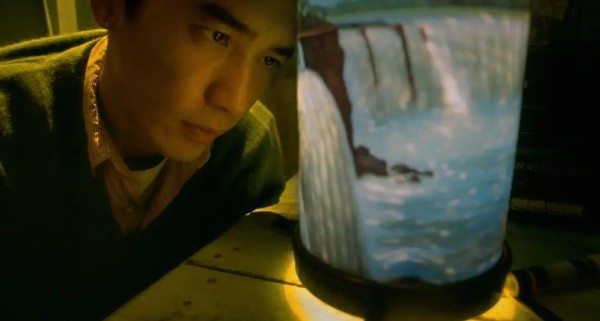
Ho Po-wing (Leslie Cheung) and Lai Yiu-Fai (Tony Leung) spend their time together chain smoking in Happy Together, shut off from Buenos Aires, the exciting new city they’ve arrived in. Recounting one of their breakups, Fai says: “He only said being with me was boring and that we should take a break.” Like many of Wong’s characters, Po-wing is scared to commit because he’s worried about being ground down bymonotony.
何宝荣(张国荣饰)和黎耀辉(梁朝伟饰)在《春光乍泄》中一支接一支地抽烟,与他们刚刚来到的令人兴奋的新城市——布宜诺斯艾利斯隔绝开来。在讲述他们的一次分手时,黎耀辉说:「他只说和我在一起很无聊,我们应该休息一下。」和王家卫电影中的许多人物一样,何宝荣害怕承诺,因为他担心被单调的生活压垮。
In Chungking Express, Wong shows how Faye is struggling with the routine of city life by using the same song over and over again. Working at a fast food shop so she can save money to go travelling, she dances around the kiosk listening to The Mama and the Papas’ ‘California Dreamin’’ on repeat, the days blurring into one. The only way she can escape is through music and dreams of a better life in a faraway place. Maybe there she’ll make some new memories, ones that will last forcenturies.
在《重庆森林》里,乐曲一遍遍地响起,展示了女招待阿菲是如何在城市的日常生活中挣扎的。她在一家快餐店工作,这样她就可以存钱去旅行了。她绕着售货台跳舞,听着爸爸与妈妈合唱团(The Mamas & the Papas)的《加州梦》,日子变得模糊起来。她唯一可以逃离的方式是透过音乐,梦想着在遥远的地方过上更好的生活。也许在那里她会创造一些新的记忆,那些将持续几个世纪的记忆。
网址:【译】在孤独与渴望的情绪中:王家卫的电影是如何描述情绪的? http://c.mxgxt.com/news/view/295031
相关内容
总是莫名不开心,你不是情绪化,只是「情绪颗粒度」太低各路明星如何评价王家卫,李安:王家卫,我的英雄!
情绪本身不是问题,看不见的情绪才可怕
对话张建德 王家卫是香港电影的“系统性瑕疵”
张爱玲的情史:爱与孤独的交响曲
星象对人类群体情绪和行为的影响
梁朝伟与王家卫的默契程度如何?
《资本主义现实主义:私人情绪与时代症候》|每日一书
滋养自己的最好办法:《情绪疗愈》
从《阿飞正传》到《一代宗师》:王家卫电影中的身份与国族
